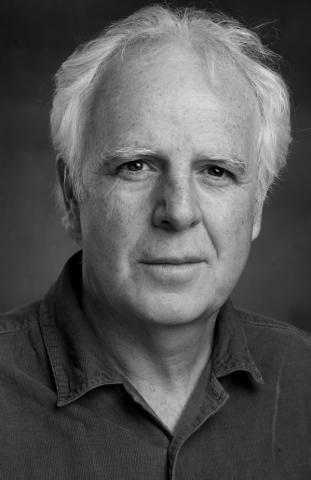
One might expect that seeing Brian Friel's FAITH HEALER in Cairo would have produced something of the cultural alienation that is itself one of the concerns of the play, but, in fact, the exotic, even somewhat estranged setting seemed to reinforce rather than diminish the power of this production. Under the direction of Richard Cave, the presentation is sharply-focused and taut, in keeping with Friel's unrelenting peeling away of the palimpsests of self-deceptions that camouflage and undermine identity.
The succession of four monologues provides Gary Lilburn (pictured) in the role of the travelling healer, Frank Hardy, Amanda Hurvitz, as his wife Grace, and Martin Head as Teddy, his cockney manager, with ample opportunity to show that it is the sovereignty of the word that contains the nuanced tension and genuine impact of this by now classic play. In their ability to tease out and unravel language, all three performers not only establish mood, explore connotation, and plumb idiom but also provide powerful instances of how languages can be deconstructed to reveal the manner in which complexity of character and intricacies of plot can be submerged in the details of personal history and individual relationships.
As the story of their journeys through Scotland and Wales unfolds, each character is engaged in sifting the past for fragments of meaning that will be commensurate with present self-perception. Such a process inevitably entails repressions, evasions, elisions and downright falsehoods, and it is this central miasma that permits the actors to excel in all those verbal, non-dramatic subtleties that are ultimately the means by which all memorable stage performances are calibrated. Indeed, it is a measure of the performances in this production that, as each character fills the canvas that becomes the self-portrait, Friel's play soon transcends such individual concerns to embrace questions of how trappings of cultural identity such as art, language and words are shifting, unreliable phenomena and, as such, are in a constant state of flux, pegged to no permanent verities associated with particular times or places.
These shifting, conflicting forces at the heart of Friel's play were reinforced by the cast of Border Crossings, coming as they did from different cultural backgrounds. Their performances readily permitted the resonances of Friel's play to move beyond the shores of these islands so that the work speaks tellingly of the complex and universal nexus where individual identity, artistic impulse, linguistic facility and cultural expression all swirl and merge to create a potent subject for theatrical exploration. Under the controlled and sure direction of Richard Cave, this production seemed, therefore, as much at home in Cairo as it would be in London, Belfast or Cardiff. The fact that this self-contained atmosphere was made palpable and credible on the Egyptian stage - with minimal sets and superbly rationed lighting - speaks as much of the professionalism of this company as it does for the power of Friel's play. In its highly mobile format, the production is ideally suited for travel, so that audiences beyond the British Isles (and Cairo) can experience both the richness of Friel's play and the subtle yet effective power of this highly rewarding production.
Professor Michael Keneally is Chair in Canadian Irish Studies at Concordia University.
